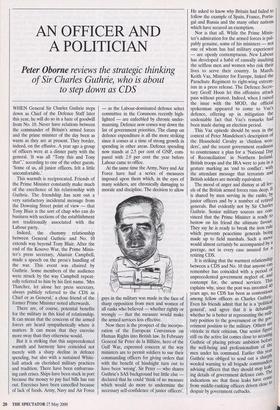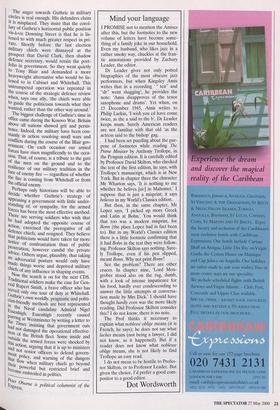AN OFFICER AND A POLITICIAN
Peter °borne reviews the strategic thinking
of Sir Charles Guthrie, who is about to step down as CDS
WHEN General Sir Charles Guthrie steps down as Chief of the Defence Staff later this year, he will do so in a haze of goodwill from No. 10. Never have relations between the commander of Britain's armed forces and the prime minister of the day been as warm as they are at present. They border, indeed, on the effusive. A year ago a group of officers were at a dinner party with the general. 'It was all "Tony this and Tony that",' according to one of the other guests. `Some of us, all junior officers, felt a little uncomfortable.'
This warmth is reciprocated. Friends of the Prime Minister constantly make much of the excellence of his relationship with Guthrie. The friendship has sent out a very satisfactory incidental message from the Downing Street point of view — that Tony Blair is the sort of chap who can do business with sections of the establishment not traditionally associated with the Labour party.
Indeed, the chummy relationship between General Guthrie and No. 10 extends way beyond Tony Blair. After the end of the Kosovo War, the Prime Minis- ter's press secretary, Alastair Campbell, made a speech on the press's handling of the war. This event was chaired by Guthrie. Some members of the audience were struck by the way Campbell repeat- edly referred to him by his first name. 'Mrs Thatcher, let alone her press secretary, always publicly referred to the CDS as Chief or as General,' a close friend of the former Prime Minister noted afterwards.
There are, of course, potential benefits for the military in this kind of relationship. It can mean that the concerns of the armed forces are heard sympathetically where it matters. It can mean that they exercise more sway than they otherwise would.
But it is striking that this unprecedented warmth and harmony have coincided not merely with a sharp decline in defence spending, but also with a sustained White- hall attack on cherished military practices and tradition. There have been embarrass- ing cash crises. Ships have been stuck in port because the money to pay fuel bills has run out. Exercises have been cancelled because of lack of funds. Army, Navy and Air Force — as the Labour-dominated defence select committee in the Commons recently high- lighted — are enfeebled by chronic under- manning. Defence now comes way down the list of government priorities. The clamp on defence expenditure is all the more striking since it comes at a time of strong growth in spending in other areas. Defence spending now stands at 2.5 per cent of GNP, com- pared with 2.9 per cent the year before Labour came to office.
At the same time the Army, Navy and Air Force have had a series of measures imposed upon them which, in the eyes of many soldiers, are chronically damaging to morale and discipline. The decision to allow gays in the military was made in the face of sharp opposition from men and women of all ranks who believed — whether rightly or wrongly — that the measure would make the armed services less effective.
Now there is the prospect of the incorpo- ration of the European Convention on Human Rights into British law. In February General Sir Peter de la Billiere, hero of the Gulf War, expressed concern at the way ministers are to permit soldiers to sue their commanding officers for giving orders that with the benefit of hindsight turn out to have been 'wrong'. Sir Peter — who shares Guthrie's SAS background but little else declared that he could 'think of no measure which would do more to undermine the necessary self-confidence of junior officers'. He asked to know why Britain had failed to follow the example of Spain, France, Portu- gal and Russia and the many other nations which have secured an exemption.
Nor is that all. While the Prime Minis- ter's admiration for the armed forces is pal- pably genuine, some of his ministers — not one of whom has had military experience — are openly contemptuous. New Labour has developed a habit of casually insulting the selfless men and women who risk their lives to serve their country. In March, Keith Vaz, Minister for Europe, linked the Parachute Regiment to right-wing extrem- ism in a press release. The Defence Secre- tary Geoff Hoon let this offensive attack pass without protest. Indeed, when I raised the issue with the MOD, the official spokesman appeared to come to Vaz's defence, offering up in mitigation the undeniable fact that Vaz's remarks had been made during an election period. This Vaz episode should be seen in the context of Peter Mandelson's description of the Household Cavalry as 'chinless won- ders', and the recent government readiness to countenance a plan for a 'National Day of Reconciliation' in Northern Ireland. British troops and the IRA were to join in a gesture marking an 'end to conflict', with the attendant message that terrorists and British soldiers are morally equivalent.
The mood of anger and dismay at all lev- els of the British armed forces runs deep. It is shared by men serving in the ranks, by junior officers and by a number of retired generals. But evidently not by Sir Charles Guthrie. Senior military sources are con- vinced that the Prime Minister is ready W bestow on his friend the ultimate favour. They say he is ready to break the iron rule which prevents peacetime generals being made up to field marshals. Such a move would almost certainly be accompanied by a peerage, not in every case assured for a retiring CDS. It is striking that the warmest relationship between a CDS and No. 10 that anyone earl, remember has coincided with a period Oil unprecedented government neglect of, au? contempt for, the armed services. 111,,,,s explains why, since the post was invented go years ago, no CDS has been as contentious among fellow officers as Charles Guthrie: Even his friends admit that he is a 'political general', and agree that it is debatable whether he is better at representing the mill' tary position to the government or the ri errnnent position to the military. Others are vitriolic in their criticism. One senior flee still on the active list comes close to accusing Guthrie of placing private ambition before the well-being and professionalism of the men under his command. Earlier this year Guthrie was obliged to send out a sharply worded warning to all brigade commanders_ advising officers that they should stop le alt' details of government defence cuts. The indications are that these leaks have coil from middle-ranking officers driven close despair by government cutbacks. The anger towards Guthrie in military circles is real enough. His defenders claim it is misplaced. They insist that the corol- lary of Guthrie's horizontal public position vis-a-vis Downing Street is that he is lis- tened to with much greater respect in pri- vate. Shortly before the last election military chiefs were dismayed at the Prospect that David Clark, then shadow defence secretary, would retain the port- folio in government. So they went quietly to Tony Blair and demanded a more heavyweight alternative who would be lis- tened to in Cabinet and Whitehall. This untrumpeted operation was repeated in the course of the strategic defence review when, says one ally, 'the chiefs were able to guide the politicians towards what they wanted, rather than the other way around.' The biggest challenge of Guthrie's time in office came during the Kosovo War. Britain above all nations showed grit and persis- tence. Indeed, the military have been con- stantly in action resolving small wars and conflicts during the course of the Blair gov- ernment. On each occasion our armed forces have risen magnificently to the occa- sion. That, of course, is a tribute to the guts of the men on the ground and to the resilience of our military tradition in the face of enemy fire — regardless of whether the fire is coming from Whitehall or from the official enemy. Perhaps only historians will be able to decide whether Guthrie's strategy of appeasing a government with little under- standing of, or sympathy, for the armed forces has been the most effective method. There are serving soldiers who wish that he had adopted the opposite course of action, exercised the prerogative of all defence chiefs, and resigned. They believe that politicians would have taken far more notice of confrontation than of public prostration, however candid the private advice. Others argue, plausibly, that taking an adversarial posture would only have Made things worse and deprived military chiefs of any influence in shaping events. Now the search is on for the next CDS. Traditional soldiers make the case for Gen- eral Rupert Smith, a brave officer who has served only one tour of duty at Whitehall. Guthrie's own worldly, pragmatic and politi- c. Ian-friendly methods are best represented In the Naval candidate Admiral Nigel Essenhigh, Essenhigh recently caused rtcung at Westminster by writing a letter to h e, limes insisting that government cuts ..au not damaged the operational effective- ness of the British fleet. Some inside and thutside the armed forces were shocked by _la, action, arguing that it is up to ministers 'ula not senior officers to defend govern- that t Policy, cy, and warning of the dangers their flow when military chiefs go beyond be Powerful but restricted brief and Comeembroiled in politics.
Peter Oborne is political columnist of the -4cPress.



































































 Previous page
Previous page